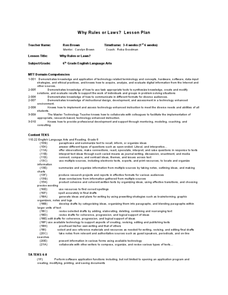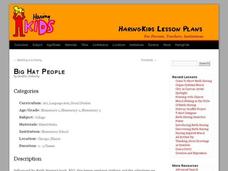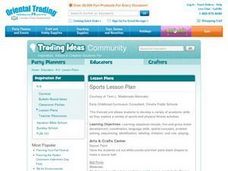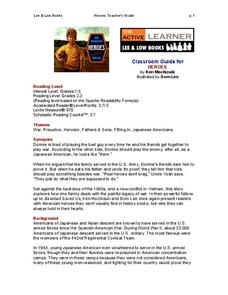Curated OER
Reader's Theater
Conduct a Reader's Theater. Third, fourth, and fifth graders rewrite books with a baseball theme to a Reader's Theater format. They form groups of four or five, practice reading the script, and then perform it for an audience.
Curated OER
The Outsiders
Tenth graders complete a variety of activities related to the first two chapters of the book The Outsiders. They define metaphor, simile, idiom, and hyperbole, and take a vocabulary pre-quiz. In small groups, they write a character...
Curated OER
Beisbol! Latino Baseball Pioneers and Legends
Students explore Latin America by researching the favorite past time, baseball. In this Latin culture lesson, students identify the leaders in the Latin American baseball movement such as Felipe Alou, Jose Mendze, and the great Roberto...
Curated OER
Trading Information
Students create a trading card about a state bordering the Mississippi River. Using traditional and internet research, students generate a list of interesting facts about their chosen state using the five themes of geography. They use...
Georgia Department of Education
Exploring Poetry and Poets
Combine the study of poetry and non-fiction texts with this complete and ready-to-use six-week unit. After reading numerous poems from local writers and compiling a personal anthology, high schoolers find and read a memoir or biography...
Curated OER
Why Rules or Laws
Here’s a fresh approach to establishing classroom rules at the beginning of the school year. Class groups brainstorm what they know about rules for baseball, basketball, and football. They then consider how the games would differ without...
Curated OER
Baseball Vocabulary
Pupils review new vocabulary and verb conjugations. They are divided into two teams and simulate a game of baseball while practicing their new vocabulary. They are given the word in Spanish or English.
Curated OER
Big Hat People
Students investigate visual arts by reading a children's book in class. In this collage lesson, students read the book by Keith Haring titled Big and discuss the themes and settings. Students discuss how adjectives are used to describe...
Curated OER
Keepers
What are some things you think are special enough to keep? Discussing special things launches young learners into reading Keepers. They investigate related vocabulary and practice before, during, and after reading comprehension...
Curated OER
Negro Leagues Baseball
Students think critically and creatively while researching Negro Leagues baseball vocabulary terms and producing a political cartoon defining those terms. The research for this lesson is done on the internet.
Curated OER
Sports Lesson Plan
Have your class participate in a variety of sports and craft activities using this resource. With sports as the theme, learners work on art projects. Students create soccer ball prints, a three dimensional football, and a sports collage.
Curated OER
America's Pastime
Young scholars relate Newton's Laws of Motion to the game of baseball. They compare and contrast the materials used in baseballs that could affect their performance. They also determine how friction can be increased or decreased in a...
Curated OER
Heroes
Students explore reading comprehension strategies. In this character development and reading comprehension lesson, students brainstorm common traits of "heroes." Students read Heroes, then identify the personal conflicts the story...
Curated OER
Couch Potato or Inertia Victim?
Sixth graders how primary research is carried out. They design a simple survey questionnaire to interview people about their week average television watching time. They analyze the results and write a report based on the information.















